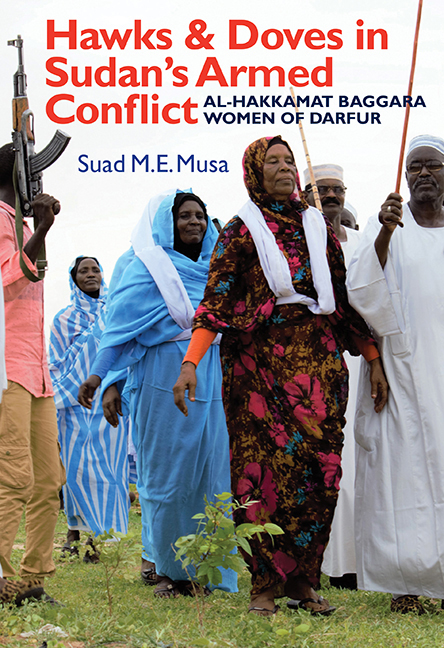Book contents
- Frontmatter
- Dedication
- Contents
- List of Illustrations
- Acknowledgements
- Glossary
- Abbreviations
- Note on Transliteration
- Introduction: Conflict in Darfur and the Role of Rural Darfuri Women
- 1 Ethnicity and Administration in Darfur
- 2 Conflict in Darfur: Causes and Implications
- 3 Al-Hakkamat Women
- 4 Local Inter-ethnic Conflicts
- 5 Government and Racial Assimilation of Ethnic Groups
- 6 Liaising with Government
- 7 New Duties and Obligations
- 8 Roles in Peace and Reconciliation
- 9 Urban Identity and Social Change
- 10 Conclusion
- Appendix: Darfur Chronology, 1445–2017
- Bibliography
- Index
- Eastern African Studies
- Frontmatter
- Dedication
- Contents
- List of Illustrations
- Acknowledgements
- Glossary
- Abbreviations
- Note on Transliteration
- Introduction: Conflict in Darfur and the Role of Rural Darfuri Women
- 1 Ethnicity and Administration in Darfur
- 2 Conflict in Darfur: Causes and Implications
- 3 Al-Hakkamat Women
- 4 Local Inter-ethnic Conflicts
- 5 Government and Racial Assimilation of Ethnic Groups
- 6 Liaising with Government
- 7 New Duties and Obligations
- 8 Roles in Peace and Reconciliation
- 9 Urban Identity and Social Change
- 10 Conclusion
- Appendix: Darfur Chronology, 1445–2017
- Bibliography
- Index
- Eastern African Studies
Summary
Engaging al-Hakkamat Baggara women of Darfur in Sudan's civil wars has been instrumental, yet it needs to be seen in the context of armed conflict between tribes and ethnic groups in Darfur and the wider context of power and struggle in rural Africa more generally. This contesting against the central government has not been stimulated primarily by reasons of differences in culture, identity or religion, although along the way these have become rallying points. There is a lot of evidence to indicate that these conflicts have been induced by the struggle of people to secure livelihoods and political power within a context overwhelmed by conflicting and tense power relations. This context has been instigated by the state's administrative approach in managing tribal and ethnic groups in rural areas, where most of the population are in pastoralist and agropastoralist communities. Since the annexation of the Darfur sultanate into the condominium rule of Sudan in 1917, the state's rulers have consistently demonstrated an inability to manage fairly the affairs of these communities, which had been well organised and effectively managed in the past.
COLONIALISM AND POSTCOLONIALISM
As we have seen, to understand al-Hakkamat role it is of paramount importance to comprehend the history and administrative system of the Darfur sultanate (1445–1916) and how it succeeded in maintaining a relatively stable environment and coexistence among diverse tribes and ethnic groups. During the sultanate, tribes were administered through specifically allocated specific homelands, the Dars, where most of the tribes were allocated Dars and tribal chiefs entrusted with considerable autonomy and leverage to administer their own people and the land on behalf of the sultan. Yet these Dars were well connected to the central power of the sultanate and under its close supervision. In the aftermath of the sultanate conquest, first by the Anglo-Turkish (1874–81) and then by the condominium (1917–56) administrations, the sultan was killed and the sultanate hierarchy of satellite authorities (Sharati, Nuzzar, Omad, etc.) were weakened. The Dars and tribal authorities were left disconnected and detached administrative units deprived of a close patron who could earn or enforce their allegiance to the principles of the state and who would also come to their rescue if help was needed.
- Type
- Chapter
- Information
- Hawks and Doves in Sudan's Armed ConflictAl-Hakkamat Baggara Women of Darfur, pp. 182 - 192Publisher: Boydell & BrewerPrint publication year: 2018

